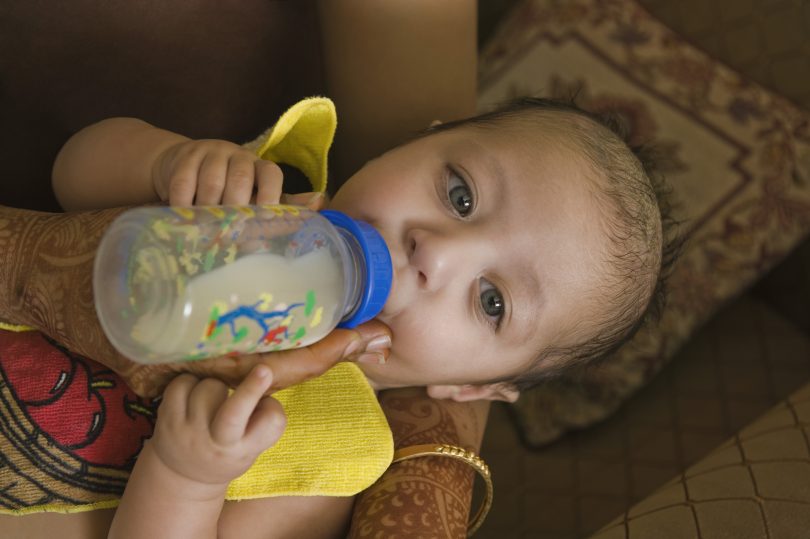As a parent, you always think about providing your baby with the best infant nutrition. While babies grow up, you must always consider introducing them to new types of food, instead of only using breast milk and formula.
If you are a new mum or a new dad, confused and asking questions like when can babies eat solid food? What’s the best baby feeding guide? Or how to make baby food?
Don’t worry. We are here to help. We will give you the answers and the best tips for healthy and nourishing baby growth.
When to start baby food?
It’s recommended to wait until your baby finishes his or her 6months of age before introducing solid food, that’s what the pediatrician usually advice, yet some babies can start at 4months old; however, this depends on your baby’s growth ( head control, sitting, etc. ), and you must follow a 4months baby food chart to do it properly.
You can also start noticing your baby’s curiosity about food when you are around the table having a meal. You might then bring in baby food to give your bundle of joy a chance to taste things step by step.
What kind of food should you start with?
The best first foods for babies are vegetables, one new flavor at a time. You can use vegetables such as potatoes, carrots, and green beans. Your vegetables should be boiled and very well mixed. Some fruits like apples and pears can also be steamed and smashed. You can give your child other fruits like bananas and avocado mixed with a little bit of milk.
When do babies start eating cereals?
You can do that after the baby’s first 6months, or between 4 and 6months, but as said previously, that depends on your baby’s growth. 3 or 4 tablespoons of organic baby cereals like oatmeal and rice per day are enough. You can mix them with milk and feed your baby with it.
Bear in mind that the portions must be appropriate and according to your baby’s appetite too. Don’t worry if he or she doesn’t like it at first. You should go slowly, be patient, and give your baby the time to appreciate new flavors and textures.
Baby food allergies.
If you’re concerned about your little one having an allergy, try to stick to the same food for 2days at least before adding a new ingredient so you can observe the baby’s reaction.
It will be better to stay away from some types of food like eggs, peanut butter, chocolate, strawberries, and some seafood. These should be introduced later at an appropriate age ( 2 years old and on)
If your baby shows any allergic reaction such as rash, vomiting, or difficulty breathing minutes or a few hours after consuming food, call your pediatrician or take him or her to the hospital.
Homemade baby food:
The industrial food variety for babies is large and sometimes tempting, but is it healthy for your kid? Does it give your baby the necessary nutrients for his growth and development? If you are thinking about making baby food yourself, here are some pieces of advice to make it easier, faster, and good:
– Use a blender, a regular one, not necessarily a special one. It is always suitable for all kinds of purees.
– Use milk to mix your veggies and fruits, breast milk, or formula. You can also use yogurt or coconut cream or only water.
– If your a busy parent, use freezer bags and ice cube trays for storage.
Here are five homemade baby food recipes you can safely feed your baby with:
1- Vegetable puree.
Purees are excellent food for kids. For this recipe, use: 1carrot, 1potato, 1clove of garlic, and a slice of onion.
Wash your vegetables and peel them. Boil everything until it’s very well cooked and then mix them in a blender. You can add a small piece of zucchini or a little bit of celery from time to time.
2- Apple compote.
Wash and peel the apple and then cut it in quarters, steam it for 10 minutes and then mix. If it’s too thick, add abit of water.
3- Avocado purree.
You can smash the avocado with a fork and add a little bit of lemon juice, just a few drops, or blend it with some milk.
4– Fish and vegetables: (starting 7month)
The ingredients: 1fillet of any cooked white fish, 1cooked sweet potato, 1carot, and a clove of garlic.
Blend it all with hot water.
5- Chicken and vegetable puree.
You will need 1cup of boneless cooked and chopped chicken. 1cup of cooked vegetables (the ones your baby prefer), and 2tbsp of cooked rice.
Blend everything with boiling water.
Ps: You can start adding meat to your baby’s meals once he or she is 7months old, preferably organic meat. Add chicken, turkey, or fish to the purees for more nutrients. Avoid processed meats because of their saltiness and lack of nutritional value.
From 6 to 9months, your baby will need two meals a day and three meals a day with appropriate portions starting the age of 9months.
Don’t lose hope if your tiny doesn’t like some recipes. With time you will learn about what he or she likes and doesn’t like.
While making your homemade baby food try to keep it varied, healthy, and organic. Going to your nearby organic grocery store for better food quality is one step further to give your baby all the benefits he or she needs.
Stay away from spicy and industrial ingredients. Natural food is always better.
I hope that these recipes and tips gave you an idea about how to start a solid nutritious program for your baby.

